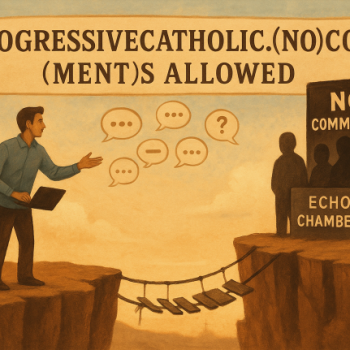GODSTUFF:
A SPECIAL SUNDAY DOUBLE-SIZED EDITION: THE REVEREND OF ROCK ‘N’ ROLL
It was a perfect summer night. A peachy gloaming lit the western skyline as I drove home, top down on the motorized toboggan, through the quiet streets of Chicago’s West Side.
And blaring from the tinny speakers I’d cranked up to nearly 11 was one of those songs that makes you sing at the top of your voice (even in a convertible) and throw your hands in the air as if to say, “Man, it’s great to be alive!”
As I rolled to a stop at a light near the United Center, the song ended and a familiar voice took to the WXRT airways, hitting me upside the head with some unexpected spiritual wisdom and leaving me gob-smacked (or, perhaps more accurately, God smacked).
It was Lin Brehmer, WXRT’s morning host, reading one of his “Lin’s Bin” essays. This one was titled, “Choosing a Faith, Part II.”
Brehmer’s essay was an answer to some listener mail, in this case a letter from Lou Keeble of Dyer, Ind.
Keeble asked, “I’m not getting any younger. Should I start going to church? If so, which one?”
This, in part, was Brehmer’s answer:
“As we get older, we begin to consider our mortality. The godless man might ask himself at the end of his life, ‘Have I miscalculated? Should I have communed with my maker?’
“Even W.C. Fields, a man known more for his hatred of kids than his love of religion, was discovered late in life with a Bible on his hospital bed. ‘Bill,’ a friend asked, ‘What are you doing reading the Bible?’ and Fields replied, ‘Looking for loopholes.’ …
“Finding your faith later in life brings a different perspective to religion. Still, watching a child you know grow up and solemnify their belief in front of family and friends will move you in mysterious ways. Is this the same baby in a stroller now chanting in Hebrew?
“A sweet 3-year-old girl I know was once at mass, and as the bewildering experience wore on, she became impatient and began to squirm. Her mother tried to placate her by pointing out a picture of the Christ child. In a voice that reverberated to every chamber of the stone cathedral, the innocent shouted, ‘I hate the baby Jesus.'”
And here’s the part that got to me, leaving me, as I’m wont to be, moved to tears.
“Now, before you wonder at the consequences,” Brehmer said, “remember what Jesus himself said, ‘Suffer little children, and forbid them not, to come unto me,’ because I can take it.'”
Not exactly what one might expect to hear on Chicago’s premier rock ‘n’ roll station.
But WXRT is not your average rock station, and the man doing the talking is not your average disc jockey.
Brehmer is, in fact, “The Reverend of Rock ‘n’ Roll.”
It’s a moniker Brehmer, 51, earned more than 30 years ago, when he was a young DJ in Albany, N.Y., where he hosted a show on Sunday mornings. It’s also a nickname fellow DJs bestowed on him because of his “proclivity for reading from Book Nine of Paradise Lost on the air,” Brehmer admitted when I cornered him in his office at WXRT last week.
“Shall that be shut to Man, which to the Beast is open?” is the verse from Milton’s poem he’s fond of reciting from memory, as if they were lyrics to a song he has heard 1,000 times.
Soundtrack to life
I have a favorite T-shirt that says, “Jesus is my mixtape.”
When I bought it, I thought its slogan was charmingly quirky, but over time, it has acquired this transcendent quality — a motto that sums up my belief that everything — everything — is spiritual.
At the center of that everythingness is, as a pastor friend of mine describes it aptly, a universal rhythm, a song we all play, like a giant, motley orchestra.
Sometimes in tune, and sometimes off key.
We call it by different names.
Still, it remains, if only we have ears to hear it — the eternal soundtrack that plays in the background of our lives.
Kind of like WXRT.
For the 18 years that I’ve called Chicago home, 93.1 FM has provided the (literal) soundtrack to my life.
It was the first radio station I tuned to when I arrived in the fall of 1988, and it’s usually the first or the last thing I hear each day. And since December 1991, except on the mornings I oversleep, Brehmer has been the mixtape master, as it were, spinning the tunes that start my day.
Since 2002, in addition to playing music, Brehmer has been writing and reading his thrice-weekly “Lin’s Bin” essays. They run the gamut from the silly to the serious to the blatantly spiritual.
While the “Reverend” nickname didn’t follow him to Chicago when he moved here from New York to work for WXRT in 1984, his peculiar vocation clearly has.
“OK, mister, I think it’s time you and I have a chat about this Godstuff,” I told Brehmer after hearing his “Choosing a Faith” essays.
Never one to flee a dare, Brehmer gamely agreed to be grilled, and, as is often the case when I go looking for God in the places some folks would say God isn’t so much supposed to be, what I found was more intriguing than I could have imagined.
“I’ve always been fascinated by religion and man’s relation to the divine,” Brehmer says, replacing his bedraggled high school copy of Norton’s Anthology of English Literature — it’s in two pieces and has no cover — on a shelf in his modest office at WXRT’s North Side studios after reading a few more verses from Paradise Lost.
“I’ve always been interested in the common ground that all mysticism, from various disciplines seems to have. The idea of, from a line in one of T.S. Eliot’s poems: ‘Teach us to care and not to care.’ That whole notion of to care enough to achieve some mystical union with God is to take on the pride that would prevent you from having that kind of awareness,” he explains.
Brehmer, who was reared attending a Protestant Congregational church in a largely Irish Catholic neighborhood in Queens, N.Y., and attended a high school that was “95 percent Jewish,” is not a regular churchgoer today.
“I’m a mystical expressionist,” he answers when I ask him to describe himself spiritually. “I take the idea of mysticism very seriously, but I sort of paint it my own way. I think the idea that there is something within each and every one of us that can take us to a place we’ve never been before is part of what makes it great to be alive.”
Music is a vehicle that propels Brehmer — and me and so many others — toward the place we might call enlightenment, or God, or the higher consciousness, or Grace.
‘They were prophets’
Music is a part of our cultural conversation. And in nervous times like these, it has a lot to say.
“I think some of the cataclysmic events of the last five or six years — whether it’s Katrina or whether it’s 9/11 — have forced people to think about our role in this world, our role in the universe,” Brehmer says. “It has brought to the forefront the age-old dialogue about a God who would allow sin or horror in the world. A God who would allow evil.
“The idea that now we get to worry every day about will the next terror strike be some kind of biological warfare? Will Korea launch a nuclear attack? I think the reality of Armageddon, certainly in the last 40 or 50 years — the possibility that man, possibly, could end the world — brings faith and religion to the forefront of everybody’s mind, even if you’ve never been to church.
“What is this planet doing spinning in the universe? Was there any purpose for it to be here? Is anybody listening?” he says.
The idea that music has the power to move people in a way nothing else does seems never to be far from Brehmer’s mind or his mission on the air.
“People ask me why I got into radio,” Brehmer says, “and for me, it was almost always kind of a musical thing, almost as if I wanted to preach by playing songs that said something.
“There was a very messianic quality to Jimi Hendrix and to Jim Morrison. To a teenager, these were more than just drug-addled rock stars. These were people with song lyricy you would sit and read. When I was in 10th grade, my teacher let me do an exegesis term paper on the song, ‘When the Music’s Over,’ by the Doors.
“They were prophets. Jeremiah. They were the Ezekiels of the 20th century. And in many ways [just as the prophets] warned us of the future in the Bible and the Old Testament, there was that same sensibility from a lot of the songwriters,” Brehmer says.
“From something as obvious as ‘Eve of Destruction,’ by Barry McGuire, to, say, many Bob Dylan songs. Just as a lot of rock ‘n’ roll fans found their way to jazz through Miles Davis and the kind of influence he had over all kinds of music, I think a lot of teenagers in the ’60s and ’70s developed a spirituality through music that they otherwise wouldn’t have. At least I felt that keenly myself.”
Brehmer keeps a framed picture of his 12-year-old son, Wilson, playing a sky-blue Fender Stratocaster guitar on his desk at WXRT. I wonder if “the Reverend” thinks music has the same effect on Wilson and his peers that it did on his father as a teenager.
“I absolutely think that teenagers or young people are as much affected emotionally and spiritually by the music they hear than by any sermon they hear in a church,” Brehmer says, without a hint of bitterness or sarcasm in his voice. “Part of the reason that I’ve had trouble going to church and staying in church is not feeling like the sermon some minister was espousing was connecting with me in any way. Whereas a good four lines from a John Hiatt song could mean so much more to me.”
Grace in the guise of a song
As someone who had her first spiritual epiphany at age 12 while listening to U2’s song “Gloria,” in a friend’s living room, I totally understand this.
The message even can be the same — sometimes, as was the case with the song “Gloria,” the words themselves are the same — as what we hear in church or temple, mosque or shul. But there’s something mightily powerful about hearing the words sung aloud, with passion or pathos, as a guitar wails and a bass line thumps.
While Brehmer is explaining music’s more mystical qualities, I become aware that a song is playing quietly on the radio receiver tuned to WXRT on his desk. It’s U2’s “Walk On.”
When I mention it to Brehmer, he turns up the volume, and we’re both struck still, as if we’ve just been joined by an unexpected third party.
“Walk On” stirs my soul in a way few songs do, not just because it has beautiful words and a catchy tune. It’s because of the memory to which it is attached.
After being in the newsroom around the clock for a couple of days after the 9/11 terrorist attacks, I came home, exhausted and broken — spiritually, emotionally, mentally. I collapsed on the futon and turned on the TV just as U2 began to play live from London during the international telethon.
And if the darkness is to keep us apart
And if the daylight feels like it’s a long way off
And if your glass heart should crack
And for a second you turn back
Oh no, be strong . . .
Walk on, walk on
What you got, they can’t steal it
No, they can’t even feel it
Walk on, walk on
Stay safe tonight. . . .
It was precisely what I needed to hear. Not from a rock band, not from another human being. It’s what I needed to hear the Creator of the Universe say.
For that moment of grace in the guise of a song, I will be forever grateful.
“There may not be the same music, but there is some music that changes the life of everyone,” Brehmer says. “Whether it’s some ‘American Idol’ finalist that I don’t even know the name of, or whether it’s Tom Waits grunting on ‘Swordfishtrombones,’ there is some music that gets inside everybody.”
For Brehmer, it’s music like “Good Day for the Blues,” by Storyville, “Gimme Shelter,” by the Rolling Stones, “Bullet with Butterfly Wings,” by the Smashing Pumpkins, or Bob Dylan’s “It’s Alright, Ma (I’m Only Bleeding).”
For me, it might be Jeff Buckley’s “Hallelujah,” Natalie Merchant’s “Kind & Generous” or “Nessun Dorma,” from Puccini’s opera “Turandot.” (The rousing, climactic verse, “Tramontate, stelle! All’alba vincero! Vincero! Vincero!” reduces me to a puddle every time.)
“You talk about what your religious faith is supposed to do for you, and what a minister or a rabbi is supposed to do for you, providing you with counsel and wisdom and sustenance and support — sometimes the quickest avenue to all of those things is a song that you love,” Brehmer says.
‘It’s gonna be all right’
This reminds him of music he also associates with 9/11.
“The day after Sept. 11, I opened my show with a song I never play just as a song. [Now] it’s the first song I play on the anniversary of 9/11 every year. It’s a song called ‘Sunflower River Blues’ by John Fahey. And it’s . . . it’s a very simple acoustic guitar instrumental. But for me,” Brehmer says, leaning forward in his chair, his voice dropping, “it has that same feel as the second movement of Beethoven’s Seventh Symphony.
“Dunnnn dun dun dun, dunnn dunn, dunn dun dah dunn,” he hums. “It kind of plods along, but there’s a kind of resolution in the musical phrasing, and it’s the same thing in that John Fahey song.
“It’s got a certain melancholy feel to it, but at the end it kind of resolved itself in a major chord that makes you think everything’s gonna be OK,” he says, grinning wistfully. “It’s gonna be all right.”
And it is, indeed, great to be alive.
You can hear Lin Brehmer weekdays from 5:30 to 10 a.m. “Lin’s Bin” essays air at 7:15 a.m. and 6:15 p.m. every Monday, Wednesday and Friday on 93.1 FM in Chicago, or find them podcast online at www.wxrt.com.
Copyright © The Sun-Times Company
All rights reserved. This material may not be published, broadcast, rewritten, or redistributed.















